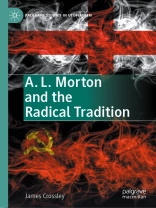This is the first book-length treatment of the life and thought of the Communist intellectual A. L. Morton (1903–1987) who pioneered studies of utopianism, radical history, and English national identity. Morton is now best known for A People’s History of England (1938) and The English Utopia (1952), but his output was vast, and he was once widely read in socialist circles and beyond. He published on the English Revolution, Chartism, the emergence of the British labour movement, the legacy of utopianism in working-class movements, Arthurian legends, Shakespeare, the Brontë sisters, Robert Owen, William Morris, millenarianism, imperialism, and much more. Through extensive archival work (including recently released secret service files) and a close reading of Morton’s publications, this book shows how Morton was a key influence on the famed generation of British Marxist historians associated with the postwar Communist Party Historians’ Group, often anticipating their more celebrated findings. This book analyses the interrelated significance of Morton’s political work and his role within the Communist Party of Great Britain at crucial points in its history. The book further functions, then, as a story of English socialism and Communism during the Cold War.
Innehållsförteckning
Chapter 1: Introduction.- Chapter 2: Growing Up.- Chapter 3: Steyning and Summerhill, 1924 1928.- Chapter 4: Class against Class: London, 1929 1934.- Chapter 5: “Something to Do with the Daily Worker”: 1934 1937.- Chapter 6: History Progresses on the Popular Front: A People’s History of England .- Chapter 7: Early Receptions of A People’s History of England.- Chapter 8: East of England: The War Years.- Chapter 9: Towards Utopia.- Chapter 10: The Communist Party Historians’ Group.- Chapter 11: The English Utopia.p.- Chapter 12: England and the USA.- Chapter 13: From Sedgemoor to Netherwood: History from Below.- Chapter 14: 1956.- Chapter 15: Civil Wars after 1956.- Chapter 16: Ranters, Sects, and Utopians: Local and Beyond.- Chapter 17: Invoking the Muse of British Socialism.- Chapter 18: Turning 60.- Chapter 19: The Matter of Britain.- Chapter 20: Ranters of ‘68.- Chapter 21: The Seventies.- Chapter 22: The Party Is Not Always Right.- Chapter 23: Reflections: Intellectuals.
Om författaren
James Crossley is Research Professor at MF Oslo in Norway, Academic Director of the Centre for the Critical Study of Apocalyptic and Millenarian Movements (Cen SAMM), and Senior Visiting Research Fellow at King’s College London.












